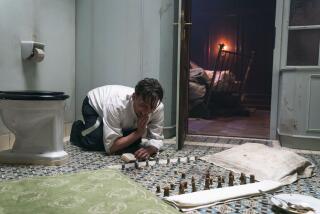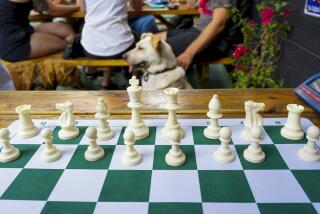Chess: Three tie at Tal Memorial
- Share via
Position No. 6134: White to play and win. From the game Ray Robson-Eugene Perelshteyn, Spice Cup, Lubbock 2010.
Solution to Position No. 6133: Black wins with 1…Rh8! 2 Qe7 Bxh2! 3 Qe6+ (not 3 Rxh2 Qg2 mate) Qxe6 4 dxe6 Bf4+ 5 Kg1 Be3+ 6 Rcf2 g4 7 Re1 Bxf2+ or 7…Ba7 8 c4 g3.
The Tal Memorial in Moscow ended in a three-way tie last Sunday among Levon Aronian of Armenia, Sergey Karjakin of Russia and Shakhriyar Mamedyarov of Azerbaijan. Each scored 51/2-31/2 in the round robin, a tribute to the late world champion Mikhail Tal. All 10 competitors are ranked among the world’s top 18.
U.S. champion Hikaru Nakamura tied for fourth place at 5-4 with Alexander Grischuk of Russia and Wang Hao of China. Former world champion Vladimir Kramnik of Russia disappointed with a modest 41/2-41/2. Others: Boris Gelfand (Israel), 31/2-51/2; Alexey Shirov (Spain), 3-6; and Pavel Eljanov (Ukraine), 21/2-61/2.
The last round was tense. Mamedyarov, the sole leader at “+3,” lost to Gelfand, enabling Karjakin and Aronian to catch up with draws. Nakamura nearly joined them, attaining a winning position against Grischuk but ultimately conceding a draw at move 90.
A year ago, Nakamura had no experience in elite tournaments and was regarded as merely a great blitz player. Now, at age 22, he is unquestionably one of the world’s strongest grandmasters. By going undefeated in Moscow, he will gain about eight rating points and advance to 10th place in the world rankings.
Spice Cup
Former U.S. champion Alexander Onischuk won the Spice Cup, a grandmaster round robin organized by the Susan Polgar Institute for Chess Excellence at Texas Tech University in Lubbock. Onischuk and German grandmaster Georg Meier scored 61/2-31/2 in the double round robin, but Onischuk took first prize because he won five games and Meier only four.
Top-seeded Zoltan Almasi (Hungary) went undefeated but won only twice. He and Wesley So (Philippines) shared third place. Eugene Perelshteyn (Massachusetts) scored 3-7, and 15-year-old Ray Robson (Florida) had 21/2-71/2. The top four finishers are ranked among the world’s 100 best players.
American Open
The Thanksgiving tradition, the American Open, returns for its 46th edition Thursday at the Radisson Hotel, 6225 W. Century Blvd. in Los Angeles. Entrants may choose a four-day or three-day (starting Friday) schedule for the eight-round main event.
The holiday weekend also includes free chess lectures, nonstop chess videos, a scholastic event (at 10 a.m. Saturday), a 10-minute tournament (at 8 p.m. Saturday) and a 30-minute tournament (at noon Sunday). For details and online entries, go to americanopen.org.
Local news
John Daniel Bryant and Craig Clawitter shared first place with scores of 41/2-1/2 in the Westwood Fall Open last Sunday at the Los Angeles Chess Club. Steven Baker led the under-1800 section with 41/2-1/2, followed by Mitch Jayson at 4-1. Director Mick Bighamian renamed the 37-player tournament the John Hillery Memorial in honor of the man who started the series of 40-minute game events at Bighamian’s club.
Zhanibek Amanov of Kazakhstan took the lead in the first Metropolitan Chess FIDE tournament by starting 41/2-1/2 last weekend. Next at 31/2-11/2 were Roman Yankovsky of Russia and state champion Enrico Sevillano of Tehachapi.
The round robin will conclude with games at 11 a.m. and 4:30 p.m. Sunday at 110 E. 9th St. in Los Angeles. Spectators are invited to listen to free commentary by GM Melikset Khachiyan during the final round.
Matthew Hayes and Anthony Hung led the 47-player Istvanyi Memorial at the Arcadia Chess Club. The club runs tournaments continuously on Monday evenings in the Senior Citizens building, 405 S. Santa Anita Ave. in Arcadia. For more information, visit the club’s attractive website at arcadiachessclub.com.
Games of the Week
Roman Yankovsky (Russia)-IM Zhanibek Amanov (Kazakhstan), Metropolitan Chess, Los Angeles 2010: 1 e4 c5 2 Nf3 Nc6 3 d4 cxd4 4 Nxd4 Nf6 5 Nc3 d6 6 g3 A quiet system against the Sicilian Defense. g6 7 Nde2 b6 8 Bg2 Ba6 Welcoming 9 e5?! Nxe5 10 f4 Ned7 11 Bxa8, as 11…Qxa8 12 0-0 h5 gives Black ample compensation. 9 0-0 Bg7 10 Re1 Rc8 11 Nd5 Nd7 12 Rb1 0-0 13 b3 Bb7 14 c4 Nc5 15 Bb2?! Inaccurate. With 15 b4! Ne6 16 f4 (stopping …Nc6-e5xc4), White maintains equality. Ne5! 16 Rf1 e6 17 Ndc3 f5!? Black could strengthen this aggressive thrust with the preparatory 17…Qe7. 18 exf5 Bxg2 19 Kxg2 Rxf5! 20 Nb5? More bark than bite. White had to chase Black back by 20 f4 Nc6 21 Ba3, threatening b3-b4. Note that 20 f4 Ned3? 21 Ba1 a5 22 Rf3 would favor White. Qd7! Seeing 21 Qxd6?? Qb7+ and 21 Nxd6?? Rd8 22 Nxf5 Qb7+. 21 Nf4 Rd8 22 Qe2? White’s last chance is 22 f3, closing the long diagonal. g5 23 Nh5 Qb7+ 24 f3 Even worse are 24 Kh3 g4+ and 24 Kg1 Nf3+ 25 Kh1 Nd4+. g4 25 Nxg7 gxf3+ 26 Rxf3 Rxf3 27 Kg1 Rf7?! Black is content to win with the extra exchange. Instead, 27…Ncd3! 28 Nxe6 Rf2 would force a quick victory. 28 Bxe5 dxe5 29 Nh5 Qe4 Trading Queens, as 30 Qb2? loses instantly to 30…Rd2. 30 Re1 Qxe2 31 Rxe2 a5 To meet 32 Rxe5 with 32…Rd1+ 33 Kg2 Rd2+. 32 Kg2 e4 33 Nf4 Rfd7 34 Kf2 Rd2 35 Nc3 e3+ Relying on 36 Kxe3 R2d3+. 36 Kf3 e5 37 Nfd5?! White holds out longer with 37 Rxd2 exd2 38 Nfd5. Rf8+ 38 Kg4 Rxe2 39 Nxe2 Rf2 40 Ndc3 Ne6, White Resigns.
GM Sergey Karjakin (Russia)-GM Vladimir Kramnik (Russia), Tal Memorial, Moscow 2010: 1 e4 e5 2 Nf3 Nf6 3 Nxe5 d6 4 Nf3 Nxe4 5 Nc3 The latest fashion against the Petroff Defense. Nxc3 6 dxc3 Be7 7 Be3 0-0 8 Qd2 Nd7 9 0-0-0 Ne5 In the fourth round, Kramnik tried 9…Re8 10 h4 c6 11 Bd3 Nf6 and barely drew against Nakamura. 10 h4 c6 11 c4 A surprise. Karjakin used 11 Kb1 Bg4 12 Be2 Nxf3 13 gxf3 Bh5 14 f4 to defeat Gelfand in the first round. Be6 12 Ng5!? Bf5 Logical. After 12…Nxc4 13 Qd3 Bxg5 14 hxg5 g6, White can secure a minimal edge with 15 Bf4 Qb6 16 Qd4. 13 Kb1 Re8 Next Black should test 13…h6. 14 f3 h6 15 Be2!? Offering the Knight to open the h-file. Black should accept by 15…hxg5 16 hxg5 Qd7 17 g4 Bg6. The position is incalculable, but chances seem about even after 18 Rdg1 d5 19 f4 dxc4 20 Qc3 Be4 21 Rh3 Bxg5! 22 fxe5 Bxe3 23 Rxe3 Bd5. d5?! The “safer” choice definitely favors White. 16 g4 Bg6 17 f4! dxc4 Best. Black is suffering after 17…hxg5 18 fxe5 dxc4 19 Qe1 Qc7 20 hxg5 or 17…Nxc4 18 Bxc4 dxc4 19 Qf2 Qa5 20 f5. 18 Qc3 Nd3! Not 18…Qc7? 19 fxe5 hxg5 because 20 hxg5 Rad8 21 Rde1 prepares 22 Bf4 and 23 Qh3. 19 f5! Avoiding 19 cxd3?! Bxg5 20 hxg5 Rxe3 and 19 Qxc4? Nxb2! 20 Kxb2 Bf6+ 21 Kc1 Qe7. Bxg5 20 fxg6 Rxe3 21 gxf7+? Hasty. White should keep pressure on f7 by 21 Qxc4 Qe7 22 Bxd3 Bxh4 23 Bf5. Kf8 22 Qxc4 Rxe2?! Second best. Instead, 22…Bxh4! 23 Bxd3 Qe7 safeguards Black’s King and restores equality. 23 hxg5 Qxg5?? Only 23…b5! 24 Qc3 b4 25 Qc4 Qd5 survives. 24 Qxd3 Winning, as the Queen will invade at h7 and flush Black’s King into the open. Qe3 No better is 24…Rf2 25 Qh7 Kxf7 because 26 Rd7+ Kf6 27 Qe4! pursues the King. 25 Qh7 Anticipating 25…Kxf7 26 Rd7+ Ke8 27 Rhd1. Qe4 26 Qg8+ Ke7 27 Qxg7 Qxc2+ 28 Ka1 Rf8 29 Rhf1 Threatening 30 Qf6 mate and 30 Qxf8+ Kxf8 31 Rd8+. Rd2 Or 29…Rf2 30 Qe5+ Kxf7 31 Rd7+ Kg6 32 Rg7 mate. 30 Rfe1+ Re2 If 30…Kd7 31 Rc1 Re2, White ends it with 32 Rf1 Rf2 33 Qd4+ Kc7 34 Qxf2. 31 Qc3! Counting on 31…Qxc3 32 Rxe2+ to gain a Rook. Kxf7 32 Qf3+, Black Resigns. Karjakin’s first slow-time-limit victory against the former world champion.
More to Read
Go beyond the scoreboard
Get the latest on L.A.'s teams in the daily Sports Report newsletter.
You may occasionally receive promotional content from the Los Angeles Times.










